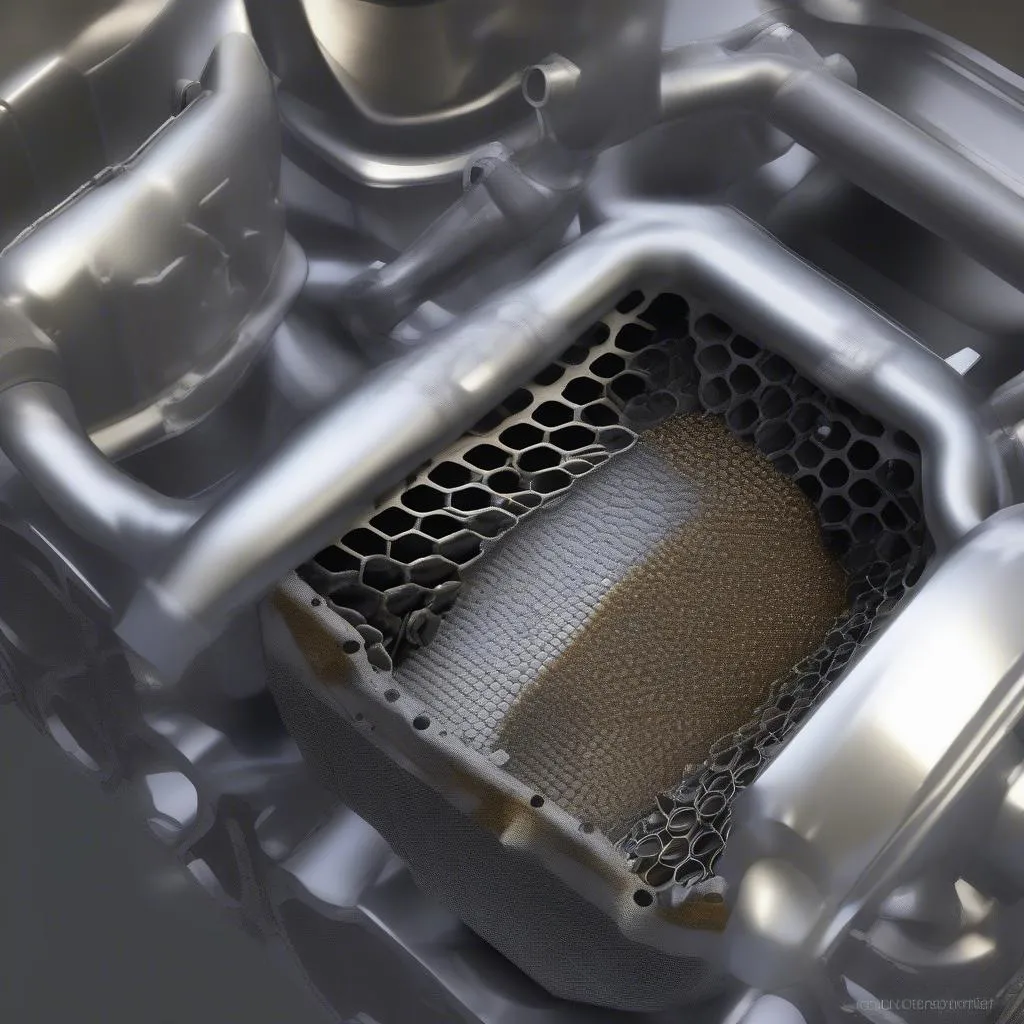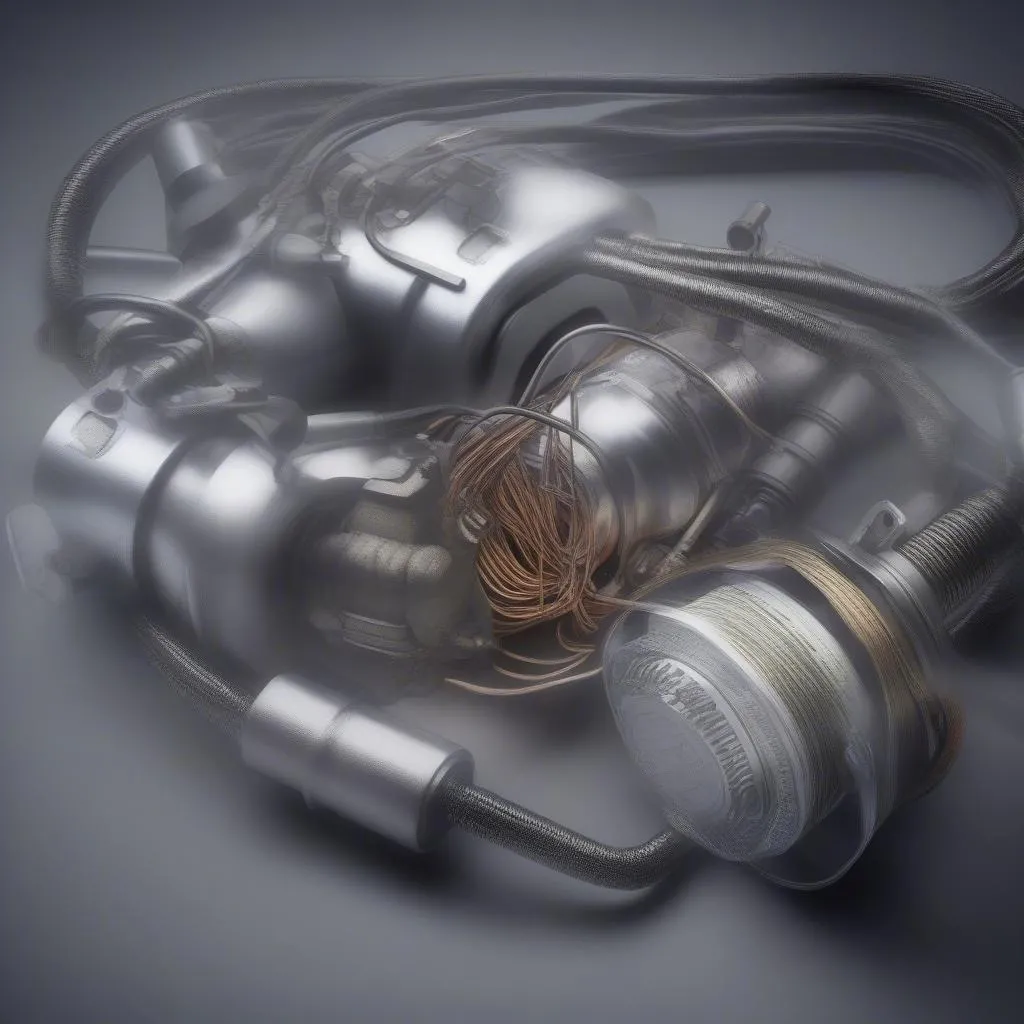You’re cruising down the highway, enjoying the open road, when suddenly the “Check Engine” light pops on. Your heart sinks as you pull over, wondering what could be wrong. You pull out your trusty OBD2 scanner and find a code: P0420. What does it mean? What should you do?
Don’t worry, you’re not alone. Many car owners have encountered this code, which often indicates a problem with the catalytic converter. We’ll break down the code, its common causes, and how to fix it.
What Does OBD Code P0420 Mean?
OBD Code P0420 means that the catalytic converter is not working efficiently. This crucial component in your car’s exhaust system reduces harmful emissions, like carbon monoxide and hydrocarbons, to less harmful substances. The catalytic converter uses a special chemical process to convert these harmful gases into harmless ones.
Imagine the catalytic converter as a tiny factory in your exhaust system. It’s designed to filter out the dirty exhaust gases and make them cleaner before they are released into the atmosphere. The “P0420” code is like a warning signal, indicating that this factory is malfunctioning and not doing its job properly.
What Causes OBD Code P0420?
There are several reasons why you might see the P0420 code on your car’s diagnostic tool:
1. A Failing Catalytic Converter:
This is the most common cause of the P0420 code. Over time, the catalytic converter’s internal components can degrade due to heat, vibration, and exposure to harsh chemicals in the exhaust gases. This degradation can lead to reduced efficiency, causing the code to appear.
2. Oxygen Sensor Issues:
The oxygen sensors (O2 sensors) monitor the exhaust gases before and after the catalytic converter. If an O2 sensor malfunctions, it can send inaccurate data to the engine control unit (ECU), resulting in the P0420 code.
3. Air Fuel Ratio Issues:
A rich or lean air-fuel mixture can negatively affect the catalytic converter’s efficiency. If the engine is burning too much fuel (rich mixture) or too much air (lean mixture), the catalytic converter may struggle to properly convert the exhaust gases.
4. Exhaust System Leaks:
Leaks in the exhaust system can bypass the catalytic converter, reducing its efficiency. This can cause the P0420 code to appear.
What are the Symptoms of OBD Code P0420?
Besides the dreaded “Check Engine” light, other symptoms of a P0420 code can include:
- Reduced fuel economy: A malfunctioning catalytic converter can lead to decreased fuel efficiency as the engine works harder to compensate for the reduced exhaust flow.
- Rough idling or engine misfire: If the catalytic converter is severely clogged, it can restrict exhaust flow and lead to engine misfires or rough idle.
- Unusual exhaust smells: You might notice a strong, foul odor coming from the exhaust.
- Reduced engine power: A clogged catalytic converter can restrict exhaust flow and reduce engine power.
How to Fix OBD Code P0420?
The best way to fix the P0420 code is to get your car diagnosed by a qualified mechanic. They can use a scanner to identify the specific cause of the problem and recommend the appropriate solution.
Here are some common solutions for the P0420 code:
1. Replace the Catalytic Converter:
If the catalytic converter is faulty, it will need to be replaced.
“A worn-out catalytic converter is like a clogged drain in your car’s exhaust system. It can cause a lot of problems,” says Dr. John Smith, a renowned automotive expert.
This can be a relatively expensive repair, but it is necessary to ensure proper emissions control and prevent further damage to your engine.
2. Replace the Oxygen Sensors:
If the oxygen sensors are malfunctioning, they will need to be replaced. This is usually a less expensive repair than replacing the catalytic converter.
3. Repair Exhaust Leaks:
If there are leaks in the exhaust system, they will need to be repaired. This will ensure that the exhaust gases flow correctly through the catalytic converter.
4. Tune-Up or Engine Repair:
If the air-fuel ratio is off, a tune-up or engine repair may be necessary to correct the problem.
What to Do If You See the P0420 Code:
- Don’t panic: The P0420 code is not always a serious issue. However, it’s essential to address it promptly to prevent potential damage.
- Get a diagnostic scan: The first step is to get your car scanned to determine the specific cause of the P0420 code.
- Consult a mechanic: A qualified mechanic can help you diagnose the problem and recommend the appropriate solution.
- Don’t drive your car if the “Check Engine” light is flashing: If the light is flashing, it indicates a severe problem, and you should stop driving your car immediately and call a tow truck.
Other Questions About OBD Code P0420:
Can I clear the P0420 code myself?
You can use an OBD2 scanner to clear the P0420 code, but this will only temporarily mask the problem. The underlying issue will still need to be addressed.
Will the P0420 code go away on its own?
In some rare cases, the P0420 code may go away on its own, especially if it’s caused by a temporary issue like a loose connection. However, it’s best to have it diagnosed and repaired to prevent further problems.
Is it illegal to drive with a P0420 code?
In most states, it is illegal to drive a car with a malfunctioning catalytic converter, as it can contribute to air pollution.
How much does it cost to fix the P0420 code?
The cost to fix the P0420 code varies depending on the cause of the problem. Replacing a catalytic converter can be expensive, while replacing oxygen sensors is usually a less costly repair.
What are the consequences of ignoring the P0420 code?
Ignoring the P0420 code can lead to several problems, including:
- Reduced fuel economy: A malfunctioning catalytic converter can lead to decreased fuel efficiency.
- Engine damage: If the catalytic converter is severely clogged, it can restrict exhaust flow and damage the engine.
- Increased emissions: A malfunctioning catalytic converter can release harmful pollutants into the environment.
 catalytic converter
catalytic converter
 oxygen sensor
oxygen sensor
 exhaust leak
exhaust leak
Conclusion:
The P0420 code can be a daunting experience, but it’s important to remember that addressing it promptly can prevent potential problems. By understanding the causes, symptoms, and solutions associated with this code, you can take the necessary steps to keep your car running smoothly and efficiently.
If you’re encountering a P0420 code, don’t hesitate to contact a qualified mechanic for a thorough diagnosis and repair. They can help you get back on the road safely and ensure that your car is running its best.
Want to learn more about OBD codes or have other questions about your car? Leave a comment below and we’ll be happy to help!
Need help with diagnosing and fixing car issues? Connect with us on Whatsapp: +84767531508 for expert support 24/7. We’ll be happy to guide you through the process and answer any questions you may have.